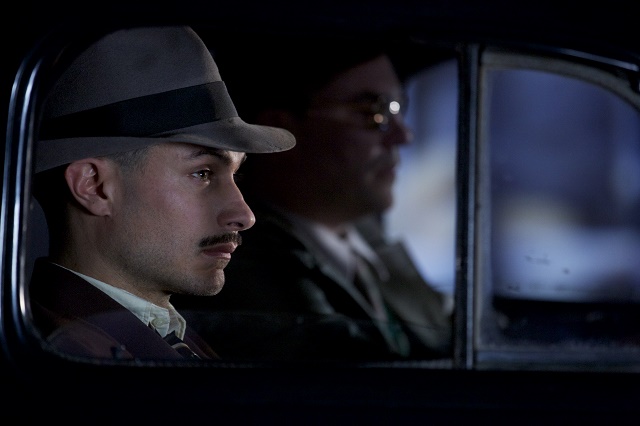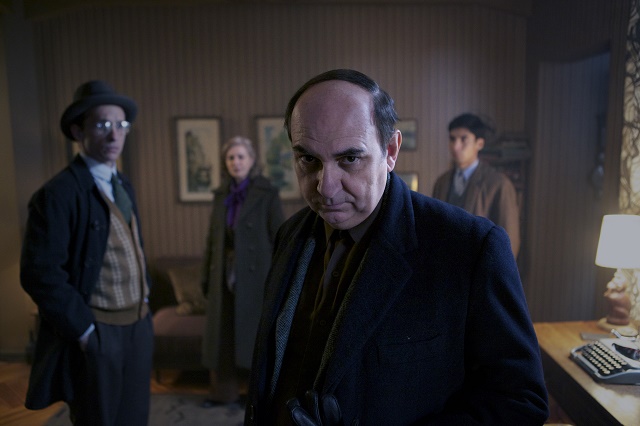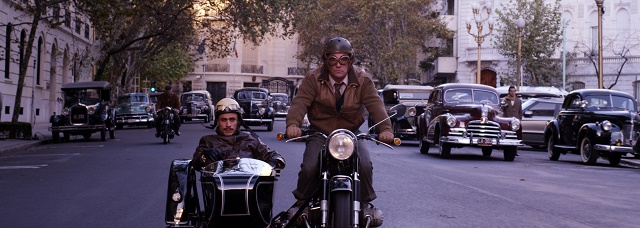
The work of Chilean auteur Pablo Laraín’s has always stood out as unconventional. Not even his recent stateside venture with Jackie, which arguably took him closer to the gates of mainstream and earned a nomination for Natalie Portman as lead actress, could made him lose any of his habitual narrative edge.
With ‘Neruda’, Larraín defies every single rule of the much maligned biopic subgenre, crafting a fitting addition to his body of work which, until ‘Jackie’, had dealt with the open wounds of Chile’s historical memory, particularly on his trilogy about the country under General Pinochet’s dictatorship, comprised by ‘Tony Manero’, ‘Post Mortem’ and ‘No’. Going back in time years before the General’s orchestrated coup d’état, it introduces Pablo Neruda both as universally acclaimed poet and as a consolidated political figure, right when the president in charge, González Videla, outlawed the communist party and issued an arrest warrant against the Nobel prize writer for his pro workers revolution ideals.
Rather than an attempt to cram his subject’s life achievements, the film focuses on a very punctual time frame, following Neruda’s attempts to escape this persecution and leave his country. Around those events, the filmmaker builds up a multi-layered portrait of the man and the circumstances surrounded him in playfully unexpected ways.
Luis Gnecco, who underwent a notable physical transformation to look like his character, plays the poet as a man as grumpy and vain as powerful and evocative was his work. Just like it happened in Jackie, the conflicting duality between real self and public persona becomes an essential part of this depiction. Neruda’s storyline is driven through the voiceover of his nemesis, police officer Oscar Peluchonneau, performed by Gael García Bernal in subtly humorous fashion, embarking on a cat-and-mouse chasing game in order to capture the fugitive wordsmith. The introduction of this fictitious character, both as the prosecutor and the creation of the writer, allows the film to dig deep into questions about the relationship between an author, particularly one of this caliber, and his work. In spite of these imaginary elements, the departure from the constraints of factual accuracy helps ‘Neruda’ to become a more accomplished tribute to the poet’s universe than any more formally conservative film could have been.

Devoid of the pompous deference historical figures are usually rendered with, ‘Neruda’ is a thoroughly enjoyable piece of work. The opening scene, a heated political debate taking place on a toilet, sets a farcical, often comic tone that continues throughout all scenes chosen to describe the contradictions between his life and his ideals. On this irreverent portrait he comes across as proud, hedonistic, inflexible and overtly aware of his own importance and that of his writing. But also as a man of great empathy for human suffering, willing to put his talent at the service of the people and make sacrifices for his beliefs.
Boasting an impeccable production design and gorgeous cinematography, references to classic noir cinema abound each time detective Peluchonneau appears on screen following closely the poet’s trail. They add a familiar cinematic flavour to the chase, which later almost turns into a Western while Neruda tries to escape through the astonishing mountain landscapes of the Araucania region.
Lovers of matter of fact traditional biopics may find its playful mix of reality and fiction uneasy. Yet approached with an open mind, ‘Neruda’ excels as an extraordinarily original and complex portrait of the man considered by many as the greatest poet of the 20th century.
‘Neruda’ is released in the UK on Friday the 7th.
